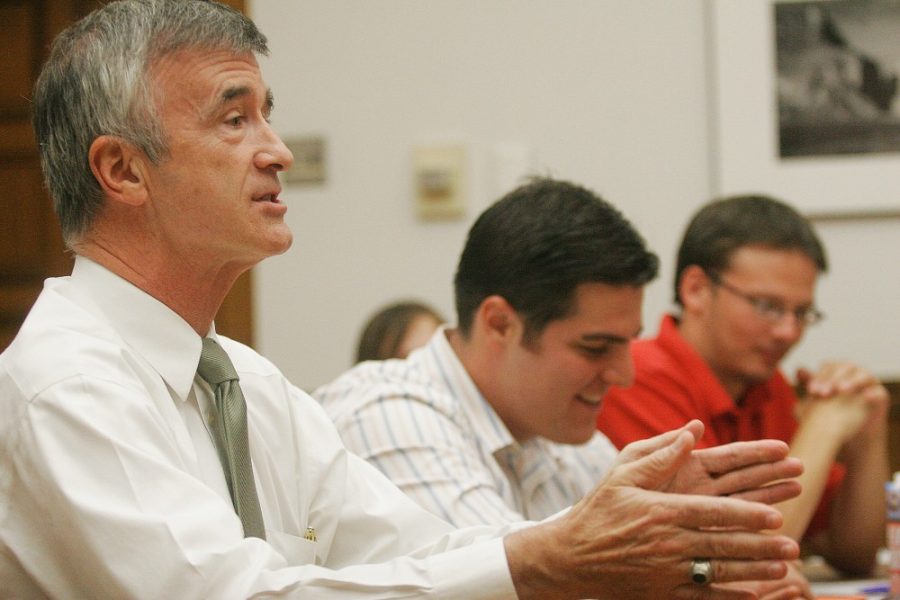GPSC President David Talenfeld didn’t waste any time telling President Robert Shelton exactly what was on his mind Monday in the Administration Building.
The leader of the Graduate and Professional Student Council immediately asked Shelton whether he could “”make a commitment right now”” on graduate student issues concerning health benefits and tuition remission.
“”There is no plan to eliminate graduate benefits,”” Shelton said.
The president went on to say that graduate students were safe from negative changes to tuition remission.
None of Shelton’s advisors have suggested cuts to graduate student benefits, and any evidence to the contrary is unfounded, Shelton said.
“”People have a great propensity for spreading rumors,”” he said. “”These are times of tension for everybody.””
Talenfeld said such rumors might be started by misinformation climbing up the ladder unintentionally.
“”It’s no one’s fault in particular,”” he said. “”It’s like a game of telephone.””
Shelton added that such rumors that put words in the mouths of those in upper administration are “”popular sport these days.””
The GPSC audience with Shelton was initially granted after the graduate student government sent a letter to the president last week.
The graduate leadership also received a commitment from Shelton to create, with the cooperation of GPSC, a comprehensive Graduate Student Bill of Rights in the near future.
Such an effort would include looking at policies that are currently in place, collecting them all in one place and seeing if and how they need to be further explained or expanded, Shelton said.
With graduate benefits seemingly safe for the time being, the crowd of about 30 at the open forum shifted concerns to what the future may look like for graduate students, including what the UA will do to offset the loss of federal stimulus money in 2012.
Shelton stressed to the graduate leadership that times will be tough for graduates, undergraduates and staff members alike. To successfully come out of the current troubled economy, the university will have to look toward alternate revenue sources, including tuition, he said.
“”We’re going to have to build back up,”” Shelton said.
Spanish doctoral student Lucy Blaney told Shelton that as Graduate Assistantships in Teaching are cut, GATs continue to teach the same amount of students.
Such a heavy workload results in GATs consistently having to work several extra hours per week on top of their current commitments, she said.
Blaney also expressed concern over the lack of necessary technology in the classroom, saying that instructors are often forced to buy their own overheads, markers and powerpoint equipment.
“”There’s no reason we shouldn’t have technology in the classroom,”” Blaney said.
Shelton responded to Blaney by saying that it does not worry him if GATs work extra hours “”a week here, a week there.””
What does concern the president, though, is continual extra work that builds up and becomes intolerable, Shelton said.
Shelton noted there needs to be a balance between the number of students, the number of GATs and the workload that is involved.
Communication between the administration and the rest of the university was also a popular topic at the meeting, with philosophy doctoral student Hope Jones relaying her own story of frustration from seeking out information from upper administration.
Jones said she has felt disrespected and discriminated against by members of Shelton’s own office.
“”If people don’t value what you do around here, they don’t understand how a university works,”” Shelton told Jones.
He also told Jones that if someone in his office ignores her, she “”should come whisper in my ear, and we can take care of it.””
Another source of miscommunication is memos regularly sent out by the President’s Office concerning the UA transformation, Blaney said.
The memos “”read like press releases”” and sometimes do not inform the university community in a straightforward way, she said.
“”It’s like, ‘Go team! By the way, we made some cuts,”” Blaney said.
Talenfeld relayed an idea to Shelton, originally thought of by Jones, to increase lines of communication by appointing GPSC representatives with the responsibility of regularly checking in with deans to make sure graduate issues are being looked after.
This system would create “”an index of accountability”” that may eventually take on a physical form that students could look up on the Internet, Talenfeld said.
Shelton and Talenfeld closed the meeting by agreeing to make similar open meetings a regular occurrence, preferably at least once a month, they said.
Shelton said those upset with budget cuts should redirect blame from the UA administration to the Arizona State Legislature, saying that if elected officials at the State Capitol do not start valuing education more, Arizona’s universities will find themselves in a bigger financial hole each year.
“”The balance here is a hard one,”” Shelton said. “”I won’t pretend like it’s an easy solution.””









